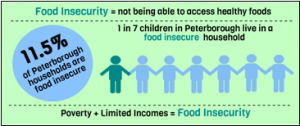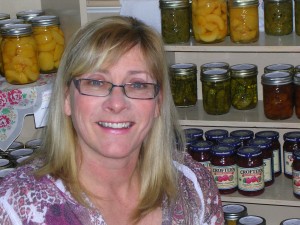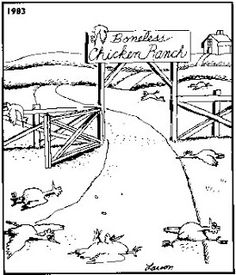Social Protection and Agriculture: Breaking the Cycle of Rural Poverty
Either we build a future for all, or there will be no acceptable future for anyone: Let’s be the Zero Hunger Generation! (UN FAO on YouTube)
Either we build a future for all, or there will be no acceptable future for anyone: Let’s be the Zero Hunger Generation! (UN FAO on YouTube)
Tuesday, October 6, 2015, Peterborough
New Report Shows Food Insecurity a Growing Concern for Peterborough
Researchers Say Now is the Time for New Approaches
A new report entitled Food Access, Housing Security and Community Connections: A Case Study of Peterborough, Ontario was released today by Carleton and Trent University academics, in association with the Centre for Sustainable Food Systems at Wilfrid Laurier University. 
The report concludes that the community of Peterborough is doing many things right when it comes to addressing food insecurity and housing insecurity, but that the issues are not going away and may even be getting worse. It argues that it is time for some new, cross-cutting, approaches.
“Peterborough was chosen for this study because it faces challenges when it comes to both food insecurity and housing insecurity,” said Dr. Peter Andrée of Carleton University and lead author of the report. “Despite this, Peterborough is home to a vibrant collection of community-based initiatives working to address these issues alongside City and County governments.”
The report identifies household food insecurity as a growing issue in Peterborough City and County. Food insecurity research shows that 11.5% of households in the City and County of Peterborough are food insecure, an increase from the 10% reported in 2013. In 2011, 26% of households (including 48% of rental households) in Peterborough paid at least 30% of their income on housing (Statistics Canada, 2014). Because of insufficient affordable housing and low average wages, renters earning the average Peterborough wage of $18/hour had to work longer than in any other Canadian city to cover the average rent for a two-bedroom apartment.
“When people are forced to choose between food and shelter, housing is often paid for first, leaving families hungry at the end of the month,” noted Dr. Rosana Pellizzari, Medical Officer of Health and Chair of the Peterborough Food Action Network. “Clearly, the common denominator between the issues of food access and housing insecurity is insufficient income to make ends meet”.
The report concludes that all levels of government need to take the issue of income security much more seriously. It is time to take action on Living Wage and social assistance rates, and explore the potential of a Basic Income Guarantee.
Download the report [pdf 949 KB]…
For further information, please contact:
Brittany Cadence
Communications Supervisor
705-743-1000, ext. 391
bcadence@pcchu.ca
Dr. Peter Andrée
Carleton University
613-520-2600, ext. 1953
Peter.Andree@carleton.ca
We live in a time of great change in our city. As artists, we may feel moved to capture the old Guelph before it is transformed. Yorklands Green Hub would like to invite artists to the former Guelph Corrections Centre before it undergoes large-scale repurposing, for a day of…
Sunday, September 27, 2015 – 10:00 am to 3:00 pm
Artists of all ages and skill levels are welcome to use any media of their choosing (wet, dry, photography, etc.) to capture the landscape of the 47 acres of heritage land of the former Guelph Correctional Centre—before it is transformed into a self-sustaining education, demonstration, innovation and research hub that will focus on the importance and practice of sustainable food production, wise water use and protection, wetland research, energy conservation and renewable energies on a heritage site.
Then, exhibit your framed work at 10 Carden Street, at the
from October 2nd to 8th! Read more…
Université Laval, Québec, 1er et 2 octobre 2015
Salle Hydro-Québec, Pavillon Alphonse-Desjardins
Le concept des Systèmes Alimentaires Territorialisés (SAT) prend racine depuis quelques années en France et constitue une matrice porteuse pour envisager des systèmes alimentaires respectueux de la diversité culturelle et biologique et à même de servir les différents aspects de la sécurité alimentaire tout en cohabitant avec le système mondialisé de consommation et de production de masse. Cette notion met l’accent sur une maximisation de l’intégration locale des systèmes, par opposition aux pratiques de l’espace géographique mondialisé. En se plaçant dans une perspective historique, on peut avancer que la mondialisation fragmente les systèmes par une division croissante du travail et un allongement des distances entre le site de production des intrants de toute nature et le site de fabrication des produits finis, mais aussi entre le lieu de production et de consommation de ces produits. Lire la suite…
 Farm 2.0 is a new project that explores how internet and communication technologies can be used in Canada’s sustainable food movement to optimize traditional agricultural practices, enable effective networks and facilitate policy change.
Farm 2.0 is a new project that explores how internet and communication technologies can be used in Canada’s sustainable food movement to optimize traditional agricultural practices, enable effective networks and facilitate policy change.
Smaller scaled organic and ecological producers are trying to build community around their farms and squeeze out a living in a landscape where farms keep getting bigger, products are more distant, retail is more consolidated and marketing is laden with ‘green washing’. These producers are being supported by ethically-minded consumers, academics and policy-makers. A diverse ecosystem of sustainable food hubs and networks, oriented toward building food systems that are more local, fair and green is coalescing in Canada.
To date, Internet and communication technologies have not figured prominently in forging food system solutions, and the intersection of technology and sustainable food is an under-developed area. One reason for this is that ecological and organic producers have historically favoured low technological, traditional, hands-on and artisanal practices. But Theresa Schumilas, who recently joined the Laurier Centre for Sustainable Food Systems as a Research Associate and Postdoctoral Fellow, thinks that these ‘low tech’ and ‘high tech’ worlds have much in common. An organic farmer herself, Schumilas wonders if there are ways emerging technologies might open up new spaces for us to imagine and realize radically different practices and make shifts to more sustainable food systems.
Theresa is friend-raising and fund-raising to establish a sustainable food and technology ‘hackerspace’ or ‘lab’ that enables connections and collaboration between Canada’s emerging food hubs/networks and designers, programmers and technologists. She calls the project ‘Farm 2.0’ to signal an extension of ‘Web 2.0’, which generally refers to how the world wide web has transitioned from being a collection of individual web sites with static information, to the web as a network of interactive computer platforms and applications. Farm 2.0 and Web 2.0 alike signal ethics such as democratization, empowerment, citizenship, sovereignty and protection of both the cyber and terrestrial commons.
In the last few years there has been an explosion of primarily proprietary software packages and web-based applications that are designed to help smaller scaled farmers with marketing. Theresa has been interviewing ecological farmers about their use of these various programs and notes that their experiences are mixed. “On one hand, farmers appreciate having help with sales logistics like inventory management and invoicing, but at the same time, they are looking for something more. This first generation of on-line marketplaces doesn’t seem to reflect the value placed on the commons that motivates many ecological farmers.” When you think about it, what has been happening in sustainable food software, mirrors what has been happening in the seed industry. Technological ‘solutions’ have mined the knowledge built in the sustainable food movement over the past 30 years, encoded that experience into a variety of internet-based applications, and sold it back to the farmers and food hubs who originated it. While the sustainable food movement has been focusing on seed sovereignty and building the ecological commons, its cyber commons is being privatized.
The foundation for a Farm 2.0 hackerspace that ‘saves code’ just like seeds, already exists. Two years ago, in Australia, The Open Food Foundation (OFF) established itself as a registered charity in order to develop, accumulate and protect open source knowledge, code, applications and platforms for fair and sustainable food systems. The Foundation focuses on bringing together farmers, food hubs and developers in a global network that facilitates open-source, non-proprietary technological innovation toward building more sustainable food systems. Their first project was the development and global launch of a technology platform called Open Food Network (OFN), that offers a way for sustainable food hubs, networks, producers and related food enterprises to link and build connections across local, regional, provincial, national and global scales. One of Theresa’s projects is to put this platform to the service of Canada’s growing sustainable food movement.
Open Food Network (OFN) is a non-proprietary, open-source, online platform. Using a set of intuitive and flexible tools, this multi-purpose software serves as a directory, communication hub and logistics platform that enables relationships among farmers, consumers, food hubs and other food enterprises. On one hand, it is an on-line marketplace. At local scales, it helps eaters find, buy, and learn about sustainable food, and helps producers and food hubs with supply chain logistics. However, the platform is more than a set of marketing tools and differs from other proprietary e-commerce platforms in important ways. OFN is a space that helps isolated sustainable food projects link, learn, and build peer-to-peer networks across scales in order to grow and strengthen a global resilient food movement. Under the oversight of the global foundation (Open Food Network), a community of coders, developers, producers, food hubs and others work to continually improve the platform and proliferate its use using charitable funding as well as reinvestment of revenues.
Since the launch of OFN two years ago, food communities around the world have been licensed and mentored by OFF to use this platform. There are now 25 networks using the platform in Australia, 20 in the UK, 2 in Norway, and teams are currently launching in South Africa, France, the US and (with this project) Canada.
 Theresa will be updating the Nourishing Communities site regularly, but if you want to be involved in her research, or if you have some ideas to share, please email her.
Theresa will be updating the Nourishing Communities site regularly, but if you want to be involved in her research, or if you have some ideas to share, please email her.
November 4 – 5, 2015 | Belleville, ON
A conference designed to facilitate stronger relationships among local food groups, challenge obstacles to growth as well as provide technical information on key topics. Local food initiatives have been innovative in running their businesses, adapting practices and looking for partners to be successful in this rapidly growing sector. Join the ‘Eastern Ontario Local Food Conference‘ to share information, learn about success stories and gather information on innovative local food businesses, projects and best practices. For more information: http://eastontl
This fall, Sudbury will be buzzing with sustainable, healthy food and farming advocates, innovators, and decision-makers gathering for Bring Food Home: Digging Deeper, based at the Sudbury Radisson Hotel on November 20-22, 2015. Sustain Ontario is pleased to announce that Early Bird conference registration is now open, along with tickets for the popular Feast of Local Flavours. Read more…
The Community Food Projects Indicators of Success FY 2014 report illustrates the collective impact of Community Food Project grantees from FY 2014 based on the metrics from Whole Measures for Community Food Systems. It includes metrics from the 6 areas of impact from Whole Measures: Healthy People, Strong Communities, Thriving Local Economies, Sustainable Ecosystems, Vibrant Farms and Gardens and Fairness and Justice. Read more…
We say that every square meter of land that is worked with agro-ecology is a liberated square meter. We see it as a tool to transform farmers’ social and economic conditions. We see it as a tool of liberation from the unsustainable capitalist agricultural model that oppresses farmers. Read more…
Since 2009, USDA has invested in 29,100 local food opportunities, including food hubs, small scale processing and farmers markets across all 50 states and the US territories. These investments include over 12,000 loans and micro-loans to small-scale producers who often sell products locally and over 13,000 high tunnels (low-cost covered structures that extend the growing season and make locally-grown products available later in the year). Read more…
IN RECENT YEARS, several surveys—including the 2013 National Food Hub Survey1 and the Food Hub Benchmarking Study2—have collected data on U.S. food hubs. What seems to be lacking from the current research on food hubs is information on operations and “lessons learned” from those involved in starting and operating food hubs. Read more…
Georgina, June 25, 2015 – Council’s unanimous decision last night to lease a portion of the Reed Farm at Willow Beach to the Ontario Water Centre is the latest initiative towards a more prosperous Georgina.
The Centre will rechristen eight acres of the Town-owned property (including the historic homestead) as the “ClearWater Farm”. ClearWater will be a community-based social enterprise to stimulate jobs and the local economy, provide affordable learning opportunities, demonstrate water-wise techniques, and celebrate “field to fork” culinary arts. Read more…
We would like to invite you to participate in a study entitled Canadian “family farm” in the twenty-first century. This study aims to better understand how well the term “family farm” applies to today’s farms in Canada. Our research team consists of Irena Knezevic (Carleton University), Kelly Bronson (St. Thomas University) and Chantal Clement (graduate student at Carleton University).
We are interested in speaking to Canadian farmers over the age of 18, whose farms fit the designation of a “family farm”. (A family farm is any farm not managed by a commune, co-operative, or a non-family corporation). If you are interested to participate you will be asked for one 30-60 minute phone interview. For more details or questions about the study, or to participate in this research project, please contact me at Irena.Knezevic@Carleton.ca
Sincerely,
Irena Knezevic, Assistant Professor
School of Journalism and Communication
Carleton University
August 18, 2015, from ProjectSOIL.ca
We’re happy to share brand new pilot project case studies from four graduate student PAR on-site food growing projects! Each is available in html and print [pdf] form.
http://projectsoil.ca/project-overview/pilots/
Students were enriched and tested by their experiences—and each was instrumental in advancing a pilot project with one of our institutional partners: the GreenWerks Garden at Lakehead Psychiatric Hospital (Lauren Turner); the Food School Farm at Centre Wellington District High School (Tim O’Brien); the Victorian Kitchen Gardens at Homewood Health Centre (Emily French); and the Our Farm Project at KW Habilitation (Elena Christy).
This year’s pilot at Hôpital Glengarry Memorial Hospital’s Therapeutic Garden is in full swing, with a weekly market and an Open House held August 7. Further news to come!
After years of pressure from independent small-flock chicken farmers, as well as from NFU, PFO, Sustain Ontario, and Eat Local Sudbury, and after province-wide consultations on what to do with new growth opportunities, Chicken Farmers of Ontario has crafted a potentially marvellous new Artisanal Chicken Policy (pdf 276 kB), and released it yesterday.
BURLINGTON, ON – July 28, 2015 – Chicken Farmers of Ontario (CFO) has announced a portfolio of new programs that will support expanded business opportunities for chicken farmers and offer Ontario consumers even more choice in accessing locally grown, high quality chicken. The new business opportunities were developed following the recent farmer, public and industry ‘Allocating Growth’ consultations, and includes an ‘Artisanal Chicken’ program which will appeal to smaller, independent, family farmers looking to meet local markets. Read more…
This means the former Small Flock Exemption policy —which remains at 300— is now the Family Food Program, language that will more clearly align with the intent of the exemption: on-farm consumption or farm-gate sales.
The Artisanal Chicken Program on the other hand “…is directed at those farmers who are interested in growing between 600 and 3,000 chickens annually for select target markets such as local farmer markets.”
The closing date for submissions for 2016 Applications is September 4, 2015.
CFO will also be creating a quota-based Local Niche Markets program for those wishing to graduate from the Artisinal Program “to support those larger niche or regional markets of 6,000 chickens or more per year”.
 … And as with any such program, the devil will be in the details. There are already questions about the fine print—like how will “traditional methods” fly with On-Farm Food Safety Assurance and Animal Care Programs, to provide mutually acceptable, appropriate and complementary levels of on-farm safety, security and viability?
… And as with any such program, the devil will be in the details. There are already questions about the fine print—like how will “traditional methods” fly with On-Farm Food Safety Assurance and Animal Care Programs, to provide mutually acceptable, appropriate and complementary levels of on-farm safety, security and viability?
The dust has yet to settle on this newly released policy. Hopefully, we will have some answers to relay in Artisanal Chicken Ranch Part II…